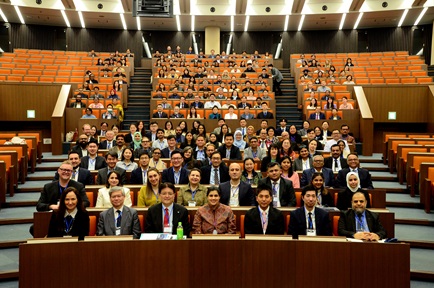Thriving with AI: Agency and Understanding to Make AI Work for Society
Third Public Lecture in the Dean’s Distinguished Speaker Series | Hybrid, 18 February 2025, Gaia Auditorium, Nanyang Business School, and via Zoom
Artificial Intelligence (AI) is transforming the way we work, learn, and engage with the world around us. But how can we ensure that AI complements human intelligence rather than replacing it? This was the central theme in the third public lecture of the Dean’s Distinguished Speaker Series at Nanyang Business School.
The event featured speaker Professor Ravi Bapna, a global expert in AI, digital transformation, and workforce dynamics. He introduced the House of AI framework, a structured approach to understanding AI’s role in business, society, and everyday life. He also discussed AI’s potential, ethical considerations, and impact on the workforce.
The session was moderated by Ms. Feon Ang, Managing Director of LinkedIn Asia Pacific.
The following is an edited transcript of the Q&A segment:
Ms. Feon: I was just paying attention when you talked about the future of AI, and you mentioned the agentic future. Can you share a little bit about how you think agents will show up in our daily lives?
Prof. Ravi: It could show up in automating repetitive tasks that you do, like finding a flight, booking it, and completing the transaction. This ability to model what people are doing using a browser, for example, is not new. In fact, one of the papers I gave the PhD students to read for tomorrow’s class is about a bidding agent I deployed about 15 years ago to snipe eBay auctions. The idea is that you can just tell the agent what you’re willing to pay, and seven seconds before the auction closes, the agent will submit your bid. That’s a dominant strategy to win those auctions if you’re the highest bidder. So, this idea of automating online tasks using AI capabilities is something I think everyone will start seeing. Some of these agents also have agency, meaning they can make choices for you. They know your objective function, what you’re trying to do. For example, if you want to spend a week in Italy and eat at boutique restaurants, the agent should be able to plan an itinerary and even handle the bookings for you, streamlining the entire process.
Ms. Feon: Do you think AI is going to take away jobs? It sounds like agents are going to do a lot of tasks.
Prof. Ravi: Research looking into this rigorously shows some interesting findings. For example, one of our colleagues, Professor Lynn Wu at the Wharton School, studied the adoption of AI and robotics in Canadian companies over the last 10 years. She found two things:
1. Companies that use AI are actually hiring more people, contrary to the belief that AI replaces human labour. The mechanism here is that these companies are doing more things. They can innovate, solve problems, access new markets, and expand their product portfolios.
2. Companies that are not using AI are getting wiped out.
So, what we’re seeing is that tasks, roles, and even managers and leaders who can use AI will displace those who cannot. By and large, there’s no shortage of grand challenges to solve. AI will augment our capacity to create new entrepreneurship, new ventures, and address issues like healthcare crises, education, and financial inclusion worldwide. I think AI can help businesses get to market faster and innovate faster.
Ms. Feon: I think that’s where the opportunity lies, right? My view is more positive than some others who see this in a more negative light. I work at LinkedIn, and I get this question daily: “Is AI going to replace jobs?” Our data shows that the skills required for jobs are going to change. By 2030, 70% of the skills needed will be different from today. So, it’s really important for people to understand what skills they need. For our audience today, what’s your advice? There’s this fear of venturing into something they don’t know enough about, especially with AI. What’s your advice for people who are afraid of getting into something they have no idea about?
Prof. Ravi: I think the combination of skill sets that will become tremendously valuable is the complementarity between deep domain expertise and AI. This is a fun time because if you’re passionate about music, pursue a career in music, go sign up for a College of Liberal Arts or Humanities and go deep into that. But also, make sure you understand how to become a good user of AI technology. Understand it at a fundamental level because that’s where we’re going to see a lot of innovation. Computational social sciences, for example, combine domain expertise with analytical skills. You don’t have to write the code, but you need to understand when to use correlation or build a causal model. If you have that sophistication and great expertise in whatever you’re passionate about, I think students should pursue their passions but combine that with good analytical skills and a solid understanding of AI. That’s where the opportunity lies.
Ms. Feon: Can you give us some other examples? For instance, I’m a florist. What would you tell a florist to do?
Prof. Ravi: Well, if you have a business and you need to engage with your customers, many AI capabilities can help you create better stories around the impact of flowers and how they can affect mood. Storytelling is not something that comes naturally to everyone, but AI can help you create engaging content. As a florist, I would use AI on the marketing side to create interesting stories and leverage platforms like Meta to share them widely. Additionally, in botany, AI models can help identify flowers and provide more information about them. This could be an engagement strategy with your customer base, using tools that allow customers not just to enjoy the beauty of flowers but also to learn more about them. People fundamentally want to grow and learn, so if you think of AI as a learning coach, it can be applied in any area.
Ms. Feon: So, would you say that AI has an impact on every profession, every person on the street?
Prof. Ravi: I think so, one way or another. There’s no industry that’s not being impacted by AI at this point. People are building all kinds of interesting use cases. For me, areas like healthcare, education, and fundamental human needs are where AI can make a significant difference. There’s so much inequity around the world in terms of financial inclusion, healthcare, and education. Entrepreneurs will use AI to create solutions that address these problems, and that will impact everyone. As a consumer, you may not directly think there’s AI behind it, but there probably is.
Ms. Feon: You mentioned companies having lots of data but not being able to harness it. Between where we are now and maximising the value of AI, what do you think is the timeframe, and what’s stopping companies from moving forward?
Prof. Ravi: I’m a bit less optimistic here because big companies have a lot of inertia. I’ll share a story: I was at an alumni event, and I asked a student who works for the largest health insurance company in the US how things were going. He said he was bored because, despite all the fancy deep learning and causal analytics models he learned, he was just running macros in Excel. This is a $300 billion company. The problem is that the executives and leaders don’t know the use cases for AI, so there’s a lack of demand for analytics skills. This is a leadership failure, but it’s also an opportunity for business schools to coach these leaders on how to use AI effectively.
Ms. Feon: If you had to predict the future for companies that embrace AI versus those that resist it, what do you think it will look like?
Prof. Ravi: I don’t have a crystal ball, but I look at the composition of a company’s board. Are there people pushing the company to think about AI? That’s a governance issue. I have a PhD student studying this: how board composition affects a company’s ability to adopt AI. On the other hand, I’m super optimistic about entrepreneurs. If you fall in love with the problem, not the solution, you’ll find ways to use AI to solve it. The barrier to entry has gone down. You don’t need as much data to build models as you did five years ago. So, for big companies, there will be winners and losers. The winners will be those with leadership driving change.
Ms. Feon: Let’s switch gears a little. Everyone is talking about DeepSeek. They’ve recently made headlines with their innovative AI models that rival top-tier reasoning models while being developed at a fraction of the cost. What are your thoughts on the potential impact of DeepSeek on the AI landscape and its implications for AI development?
Prof. Ravi: There are some question marks around the “fraction of the cost” aspect. The cost of using AI includes training the model and runtime inference costs. Some reports only focus on one portion of the cost, but the total cost, including R&D, isn’t drastically different from other models. That said, DeepSeek has shown that there will be more competition in the language model space. I’m most excited about the application layer. If a player like DeepSeek disrupts the model layer, it increases competition, which is good for innovation and welfare. I’m optimistic about DeepSeek’s potential to reduce costs and drive innovation.
Ms. Feon: There are also questions around security and the use of DeepSeek, especially when integrated with proprietary data. Do you think these concerns are valid?
Prof. Ravi: DeepSeek is an open-weight model, not open-source. Open-weight means you can use the model within your company’s firewall without your data leaving the company. This is a significant advantage for security. If your proprietary data has to go somewhere else, that’s when security concerns arise. Open-weight models like DeepSeek and LLaMA are powerful in this regard.
Audience member: I’m asking this as a devil’s advocate. Both of you mentioned that AI can create more jobs. If we set aside materialism, climate change, and sustainability, and even assume that the standard of living in developed countries is already high, how can AI create jobs other than through economic growth? Unless we create new products we haven’t imagined before, how can AI create jobs in developed countries?
Prof. Ravi: AI allows us to do more things, and companies need to have the imagination to leverage that. Early evidence shows that AI can augment workers, giving them powerful tools to be more productive. Companies can choose to use AI for brute force automation or as an augmentation engine. If workers are reskilled, they can remain productive. Governments should focus on reskilling the workforce, like Singapore has done. Without reskilling, we’ll have people who are no longer useful, and we’ll need safety nets to support them.
Ms. Feon: We’re talking about how skills are going to change so much in a given role. If 70% of the skills required are going to change, the ability to acquire new skills is essential. I love what you said about combining domain expertise with analytical skills and understanding how AI can be applied in your work. The more you venture into it, the more you can learn how it’s applicable to your expertise.
Audience member: There’s a prediction that AI will cause a big disparity in productivity among companies. A small group of people using AI well, especially agentic AI, can have astronomical productivity. Does this create a strategic disadvantage for big companies compared to smaller, more agile companies? Will this change the industry landscape?
Prof. Ravi: This ties into the theory of disruption. If incumbents are stifled by inertia, they will get disrupted. For example, no incumbent in the music industry created Spotify, it was a Swedish entrepreneur. If big companies don’t disrupt themselves, they’ll be vulnerable. It’s important for boards to challenge leadership to think differently. Companies like Nokia, which dominated the handset market, were wiped out because their board was asleep at the wheel. Governance is key.
Ms. Feon: It’s interesting that you mentioned looking at the board of directors to see if they challenge the CEO and leadership team to think differently. I was in a meeting with a large oil refinery company that’s very forward-thinking because they know AI will disrupt their business. They’re proactively training their people and recruiting externally to ensure they’re disrupting themselves.
Prof. Ravi: Nokia is a great example. They were the dominant handset company in 2008-2009 but were completely wiped out. It wasn’t because they didn’t understand platform competition, they were very sophisticated internally. The problem was their board. The chair of Nokia’s board, Risto Siilasmaa, had to reboot the company by firing almost everyone. It’s a governance failure story, but it also shows opportunities for small organisations.
Audience member: You mentioned that you look at the composition of a company’s board to see if they encourage AI adoption. You also mentioned a graduate student studying this. Is your student looking at the correlation between board composition and AI adoption?
Prof. Ravi: Yes, she’s in the data collection stage. The objective is to study board composition as a predictor of firm performance, possibly looking at stock market data. There’s a lot of literature on board diversity, and we’re trying to find patterns or associations between board composition and expectations of performance.
Audience member: There’s a lot of focus on the US and China, but Europe and India are often left aside. Europe is spending a lot of time on regulation, like the EU AI Act, which some say stifles innovation. What are your thoughts on India’s progress in AI?
Prof. Ravi: India is making significant progress, especially in local language large language models (LLMs). India has over 20 formal languages, and there’s a big push to create LLMs for these languages. The Indian model is unique because it’s being rolled out as a digital public infrastructure, meaning it will be a public good. This will spawn innovation, allowing even farmers in rural areas to access knowledge through AI. India’s digital public infrastructure, like UPI for payments, is a model for the world. India also has a large skilled workforce in AI, with many companies setting up capability centres there.
Audience member: Can you muse about the stock market and financial markets? Over the past 20 years, inefficiencies have been exploited through data and analysis. With AI, do you think this will consolidate market efficiency, making it harder to make money, or will it democratise access to data and analysis?
Prof. Ravi: I’ll start by pleading ignorance, this isn’t my area of expertise. But from what I’ve heard, finance colleagues are changing how they train future analysts because much of the work done by analysts can now be automated. The barrier to entry has gone down, so the question is how to create an advantage. My sense is that those who figure this out will gain a disproportionate advantage, leading to a more winner-takes-all scenario rather than levelling the playing field.
Ms. Feon: We could go on and on because there’s so much to talk about. Apart from agents, what do you think comes next after agents?
Prof. Ravi: I think there’s a long runway with AI right now. The interesting questions are how things will play out in different domains, like creativity. AI can help generate music, scripts, or videos, allowing creators to experiment more and potentially improve the quality of their work. Early adopters are already using AI to create multiple versions of scripts or videos, which was much more expensive in the past. I think we’ll see an improvement in the quality of creative output.
Ms. Feon: AI has even improved my love life! I recently celebrated my 25th wedding anniversary, and all I did was input a few keywords about my husband, and AI wrote a lovely poem. My husband now thinks I’m the sweetest wife!
Thank you, Dr Ravi. This has been a delightful conversation.







